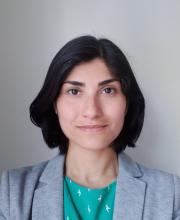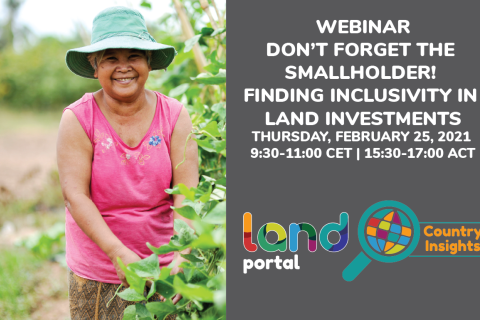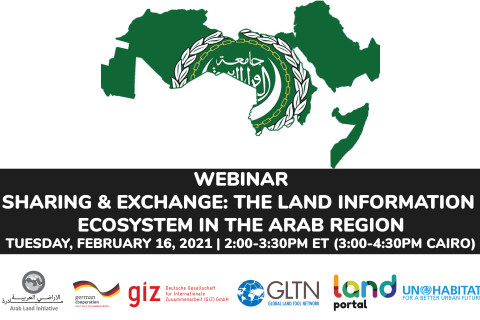
Topics and Regions
Romy leads the development of Land Portal's Country and Thematic portfolios, as well as the curation and ingestion of land-related publications and statistical datasets.
She is a communications specialist and policy advisor/project manager with more than 20 years of experience. She has worked previously with Embrapa (Brazil), CIFOR, FAO, GIZ, amongst other organizations on topics such as community forest management, payments for environmental services and agriculture & food security policy.
For the last 10 years her work has focused on land governance while as a project manager. In 2015 she supported the Global Donor Working Group on Land to advocate and secure SDG indicator 1.4.2 on land tenure security.
Romy holds a BA in Journalism from the Federal University of Pará, Brazil, and an Master of Science in Environmental Governance from the University of Freiburg, Germany.
Details
Affiliation:
Location
Contributions
Displaying 101 - 110 of 129Land Investment for Transformation (LIFT) Programme
General
LIFT is a £72.7 million programme funded by the UK Department for International Development (DFID) that operates in four regions of Ethiopia: Amhara, Oromia, the Southern Nations, Nationalities, and People’s Region (SNNPR) and Tigray. LIFT is based on the principle that if landholders have security of tenure, then they are more likely to invest in their land and agricultural practices and improve the quality of their produce. As a result, their income will rise. To achieve this, LIFT is supporting the Government of Ethiopia’s efforts on increasing rural land tenure security. This is done through land certification and developing improved rural land administration systems, to drive investment and increase productive land use. LIFT is unique in its approach as it also champions a market systems approach to catalyse household tenure security, leading to investment and improved land productivity and income. This is a first for a land reform programme on this scale. Key Stakeholders DFID Ethiopia Ministry of Agriculture Rural Land Administration and Utilization Directorate Regional Land Bureaus Microfinance institutions: ACSI, Aggar, Harbu, OCSSCO, OMFI, PEACE and Wasasa National Bank of Ethiopia REILA II Project World Bank
Launch of LIFT’s Knowledge Hub and Interactive Results Map
Originally shared via newsletter from the Land Investment for Transformation (LIFT) Programme
The Land Investment for Transformation (LIFT) programme, funded by the UK Foreign, Commonwealth and Development Office (FCDO) and implemented in partnership with the Ethiopian Ministry of Agriculture’s Rural Land Administration and Use Directorate, is one of the world’s largest land tenure programmes.
Don’t forget the smallholder! Finding inclusivity in land investments
This webinar took place in the frame of the County Insights initiative and marks the launch of Land Portal's new country portfolios for Cambodia, Indonesia, Malaysia and Singapore. The aim was to unpack the topic of Responsible Agricultural Investment through experiences from these countries, while marking out tenure security risks for smallholders and the rural poor. In particular, the discussion will highlight new aims towards equitable and sustainable practices for land user and investor, comparing positive case examples, and challenges to promote inclusive measures.
Sharing and Exchange: The Land Information Ecosystem in the Arab region
Download the summary report of this webinar here
This webinar was organized in the frame of the 2nd Arab Land Conference.
Solving Brazil's land use puzzle: Increasing production and slowing Amazon deforestation
Brazil has become an agricultural powerhouse, producing roughly 30 % of the world’s soy and 15 % of its beef by 2013 – yet historically much of that growth has come at the expense of its native ecosystems. Since 1985, pastures and croplands have replaced nearly 65 Mha of forests and savannas in the legal Amazon. A growing body of work suggests that this paradigm of horizontal expansion of agriculture over ecosystems is outdated and brings negative social and environmental outcomes.
What a rapidly urbanising Africa can learn from China’s experience
The parallels between Africa and China’s urbanisation trajectories could offer policymakers potential policy design lessons to learn from. For example, some of China’s recent successes in managing urbanisation, if adequately adapted to the unique and diverse African context, could potentially help the continent’s burgeoning city growth become more sustainable and equitable – but only with careful consideration of local circumstances.
Graduate School of Asian and African Area Studies (ASAFAS) - Kyoto University
Established in 1998, the Graduate School of Asian and African Area Studies promotes an interdisciplinary approach to area studies in order to better understand the world’s diverse regions. The school aims to train specialists in Asian and African area studies, who have a global perspective, but also retain a detailed understanding of localities.
Chinese Investment into Tissue-Culture Banana Plantations in Kachin State, Myanmar
In the last decade, Myanmar’s Kachin State has seen a boom in tissue-culture banana plantations driven by cross-border Chinese investors. This Case Study compiles field research and publicly available knowledge about the scale of the production and its economic, social and environmental consequences. The study provides a detailed snapshot of the investment model and key actors in Kachin State, the methods of land access, landscape outcomes, and experiences of plantation workers.
Webinar Report: Land Consolidation Legislation
Land consolidation is a well-proven land management instrument, which has traditionally been used for agricultural development with a main objective of reducing land fragmentation and increasing holding and farm sizes. Some European countries have a land consolidation tradition that goes back a hundred years or more. It is also widespread in particular in countries in Asia but also in Africa.











